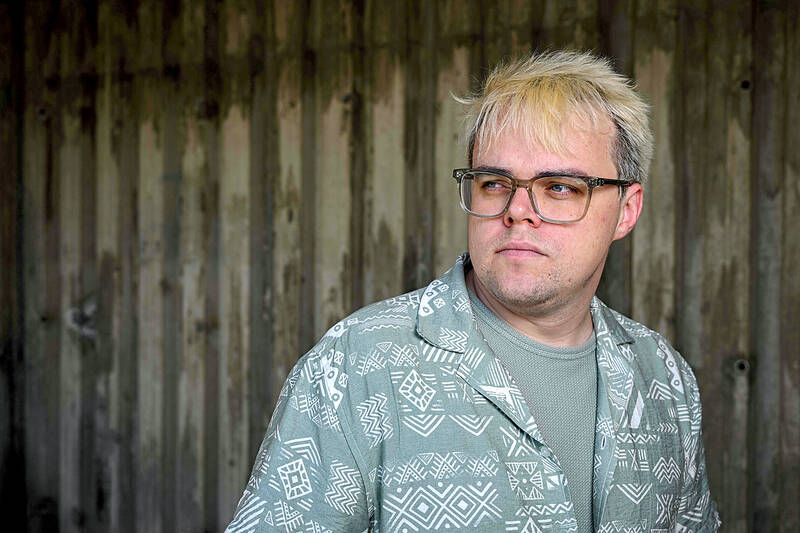When Moscow invaded Ukraine, Pavel Talankin, a staff member at a secondary school in Russia’s Ural Mountains, was ordered to film patriotic lessons, songs and morning drills. Talankin, the school’s event organizer and also a keen videographer, found the propaganda work so depressing that he wanted to quit his job in the industrial town of Karabash. Then he received what he said was the strangest message of his life. A Europe-based filmmaker got in touch, offering to collaborate on a project to document the abrupt militarization of Talankin’s school in the wake of Russia’s February 2022 invasion of its neighbor.
Talankin had earlier seen a post from a Russian company looking for people whose jobs had been affected by the war. Talankin said he was ready to talk. After receiving the foreigner’s offer, Talankin did not sleep all night.
The project changed his life forever. After teaming up with David Borenstein and shooting many hours of footage, Talankin fled Russia last summer with seven hard discs, leaving behind his mother, brothers and sisters and the town he loved. Using the smuggled-out footage, Borenstein, a Denmark-based US filmmaker, directed what became Mr Nobody Against Putin, an award-winning 90-minute documentary which exposes the intensity of the propaganda at Talankin’s school and throughout Karabash. It premiered at this year’s Sundance film festival in January.

Photo: AFP
PERSONA NON GRATA
The project cost Talankin dearly. Local officials banned his former colleagues from contacting him, he became a hate figure for supporters of the war and his school librarian mother was upset.
“I have become a persona non grata,” Talankin, 34, said from Prague, where he is now based.

Photo: AFP
Russia outlawed all criticism of the Russian military and the Kremlin and Talankin knew he had taken huge risks. But he has no regrets. “I would do it all over again.”
He has been buoyed by the support of people featured in the film including those who lost their loved ones in the war. One former colleague said she became ashamed that she, too, was “part of the system.”
The documentary reaped awards at festivals and the film crew hopes it will be available to wider audiences in Europe later this year. Borenstein said the film’s success had been a “relief” because the multinational crew overcame numerous obstacles including communication and security. But above all he was “really scared” that if the film flopped, Talankin’s sacrifice would come to nothing.
“I knew the whole time that Pasha would have to leave Russia to make this project happen,” Borenstein said, referring to his co-director by his diminutive. “That is a huge sacrifice for him, because his mum is there, his whole life is there.”
Talankin has not been able to join the crew to present the film at the Sundance festival in Utah and elsewhere due to paperwork issues, but the team hopes this will soon change.
For now he is learning English and adjusting to his new life in Prague.
HEARTENING REACTIONS
Talankin said he was heartened by the reactions at the screenings.
One viewer in the Czech Republic said he hated Russians but the film made him reconsider.
“We knew nothing about what was happening to you,” Talankin quoted the Czech as saying.
“It is a powerful and poetic piece of cinema,” said producer Alexandra Fechner, who is promoting the film in France.
“This film shows the hidden side of propaganda in Russia, which targets the youngest members of society, children who are being taught a rewritten version of history and given guns,” she said.
With the war in its fourth year, Moscow has put society on a war footing and leveraged the educational system to raise a fiercely pro-Kremlin generation.
The film features Wagner mercenaries telling children about hand grenades and teachers calling Ukrainians “neo-Nazis,” and includes an audio recording of a wailing mother at her soldier son’s funeral.
But critics also point to the documentary’s empathy and light touch. In one episode, a history teacher tells pupils that the spiraling prices could soon make gas unaffordable for Europeans.
“The French will soon be like musketeers, riding horses, and the rest of Europe too,” he said.
Borenstein said that by viewing the footage sent by Talankin nearly every day, he understood the effect of the dehumanizing war-time propaganda.
While at the beginning he found some of the clips shocking, months later his mind had become so used to the onslaught of the propaganda that he did not see the footage depicting the Wagner mercenaries as something abnormal.
“I was able to replicate some of the feelings that maybe the students and people in the school felt,” he said. “Looking at this propaganda every single day was a lesson in how desensitized you can become to it.”
A lot of the footage had not made it into the film, including the school’s preparations for the possibility of a nuclear attack.
Karabash is located close to one of Russia’s most sensitive sites, the Mayak nuclear reprocessing plant.
Talankin said Borenstein did not want the viewers to “drown in the enormous amount of negative material.”
“I have plans for this footage,” Talankin said. “Sooner or later I will start slowly releasing it.”

The Taipei Times last week reported that the rising share of seniors in the population is reshaping the nation’s housing markets. According to data from the Ministry of the Interior, about 850,000 residences were occupied by elderly people in the first quarter, including 655,000 that housed only one resident. H&B Realty chief researcher Jessica Hsu (徐佳馨), quoted in the article, said that there is rising demand for elderly-friendly housing, including units with elevators, barrier-free layouts and proximity to healthcare services. Hsu and others cited in the article highlighted the changing family residential dynamics, as children no longer live with parents,

Oct 20 to Oct 26 After a day of fighting, the Japanese Army’s Second Division was resting when a curious delegation of two Scotsmen and 19 Taiwanese approached their camp. It was Oct. 20, 1895, and the troops had reached Taiye Village (太爺庄) in today’s Hunei District (湖內), Kaohsiung, just 10km away from their final target of Tainan. Led by Presbyterian missionaries Thomas Barclay and Duncan Ferguson, the group informed the Japanese that resistance leader Liu Yung-fu (劉永福) had fled to China the previous night, leaving his Black Flag Army fighters behind and the city in chaos. On behalf of the

I was 10 when I read an article in the local paper about the Air Guitar World Championships, which take place every year in my home town of Oulu, Finland. My parents had helped out at the very first contest back in 1996 — my mum gave out fliers, my dad sorted the music. Since then, national championships have been held all across the world, with the winners assembling in Oulu every summer. At the time, I asked my parents if I could compete. At first they were hesitant; the event was in a bar, and there would be a lot

Smart speakers are a great parenting crutch, whether it be for setting a timer (kids seem to be weirdly obedient to them) or asking Alexa for homework help when the kids put you on the spot. But reader Katie Matthews has hacked the parenting matrix. “I used to have to nag repeatedly to get the kids out of the house,” she says. “Now our Google speaker announces a five-minute warning before we need to leave. They know they have to do their last bits of faffing when they hear that warning. Then the speaker announces, ‘Shoes on, let’s go!’ when